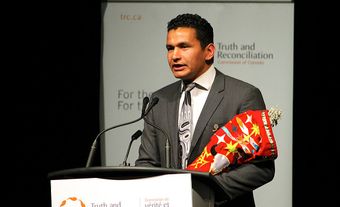James Mavor Moore, OC, OBC, writer, composer, producer, director, actor, administrator, critic, educator (born 8 March 1919 in Toronto, ON; died 18 December 2006 in Victoria, BC). A multi-faceted theatre artist and a founding father of many of the country’s key arts organizations, Mavor Moore was one of the most influential figures in the arts in Canada. He was the first production chief for CBC TV, the first artist to chair the Canada Council, and the founding director of the Charlottetown Festival and the St. Lawrence Centre for the Arts. He also wrote more than 100 works for the stage, radio and television, and was credited with making “the greatest contribution to musical theatre in Canada.” He was made an Officer of the Order of Canada in 1973 and a Companion in 1988, and was named to the Order of British Columbia. He also received the Molson Prize and a Governor General’s Award for Lifetime Achievement, among many other honours.
Education and Early Career
The son of Anglican theologian Francis Moore and theatre pioneer Dora Mavor Moore, James Mavor Moore was born into a well-connected theatrical and academic family. His first play, which he wrote at age 12, was staged by his mother at the Eaton Girls Dramatic Club. By 14 he was acting regularly on radio, first for a private station as one of The Crusoe Boys, then for the Canadian Radio Broadcasting Commission (CRBC, the forerunner of the CBC), for which he soon began to produce.
Moore graduated from the University of Toronto with a bachelor of arts in 1941. As a student there, he was a member of the University College Players' Guild and a drama critic for the school newspaper, The Varsity. He studied composition with Gladys Willan and John Weinzweig, and during the 1940s wrote songs, including settings of William Blake’s poetry.
After serving in the Canadian Army as a recruitment officer and an Intelligence officer during the Second World War, Moore returned to the CBC as a producer for CBC International Services (CBC-IS) in Montréal. Concurrently, he wrote and directed radio documentaries for the United Nations, three of which won Peabody Awards.
During this post-war period, Moore also helped his mother in her pioneering creation of the New Play Society (NPS) in 1946. Moore managed and produced the group, and also served at times as writer and actor. Chief among his NPS productions was Spring Thaw, a popular annual satirical revue to which he contributed as producer-director from 1948 to 1965.
Career Overview
With its advent in 1952, Moore moved to CBC Television, serving until 1954 as its first chief producer and creating the CBC National News, later known as The National. He was executive producer for television at the United Nations from 1955 to 1960, and worked as a critic for the Toronto Telegram from 1958 to 1960. Meanwhile, he continued to work for the stage in many capacities (e.g., at the NPS, the Crest Theatre, the Stratford Festival and the Canadian Opera Company).
From the heady days of Canada's centennial celebrations to the end of the century, Moore participated in the creation of several major theatrical institutions. He served as the founding artistic director of the Charlottetown Festival (1964–68) and the founding general director of Toronto’s St. Lawrence Centre for the Arts (1965–70). He was also the first chair of the Canadian Theatre Centre. He was a staunch supporter of Canadian culture and an outspoken critic of those who were indifferent to national culture. As a professor at York University between 1970 and 1984 (when he became professor emeritus), he championed cross-disciplinary courses that united art, politics and economics. He was also the first artist to serve as chairman of the Canada Council (1979–83).
In 1984 he became adjunct professor at the University of Victoria, and in 1986 he assumed the same role at the University of Lethbridge. He was also national president of Jeunesses musicales du Canada (Youth and Music Canada) from 1985 to 1987, while at the same time serving as director of the Canadian Music Council. A frequent lecturer on the arts, in 1987 he gave a talk at McGill University on “Music criticism today.” His master classes in arts criticism at the University of Victoria in 1985–86 inspired Moore to write a study of the effects of the mass media on arts criticism. His thought-provoking weekly columns on Canadian culture appeared in the Toronto Globe and Mail from 1984 to 1989. He also served as founding chair of the British Columbia Arts Council (1996–98).
Career in Musical Theatre
Author of over 100 works for the stage, radio and television, Moore made a particular contribution to musical theatre in Canada. He wrote the music, and/or books and lyrics, for six musicals and libretti for three operas. His musical version of Voltaire's Candide was broadcast as The Best of All Possible Worlds on CBC Radio on 9 January 1952. It was also staged as The Optimist in Toronto on 13 September 1956, and revived on CBC TV as The Best of All Possible Worlds on 17 January 1968.
Moore wrote book, lyrics and music for an adaptation of Stephen Leacock's Sunshine Sketches of a Little Town, presented as The Hero of Mariposa on CBC Radio in March 1954 and as Sunshine Town on CBC TV on 19 December 1954. Probably the most ambitious Canadian musical to that time, Sunshine Town had performances at the Royal Alexandra Theatre in January 1955 and the Orillia Opera House. In 1956, the New Play Society of Toronto put on productions in London, Toronto and Montréal. It was revived in 1968 at the Charlottetown Festival and in 1984 at the Mariposa Folk Festival. Selected songs from Sunshine Town and Spring Thaw have been published by BMI Canada.
Moore co-wrote several songs for Anne of Green Gables: The Musical, which premiered at the Charlottetown Festival in 1965 and went to become Canada's longest-running stage show.
He also directed The Love of Three Oranges (1959), A Night in Venice (1960), The Bartered Bride (1961) and Don Giovanni (1963) for the Canadian Opera Company.
In 1967, Moore collaborated with Jacques Languirand on the libretto for Harry Somers’s Louis Riel, and in 1968 he wrote the book and lyrics for John Fenwick’s Johnny Belinda. He was the librettist, with composer Harry Freedman, for the 60-minute comic opera Silents!, commissioned for performance at the Courtenay Youth Music Centre in 1978. He was the author and composer of Love and Politics (1979), and the librettist for Freedman's opera Abracadabra. He was librettist for Fauntleroy (music by Johnny Burke), which played at the Charlottetown Festival in 1980, 1981 and 1985, and for Gregory Levin's opera Ghost Dance (1985), commissioned by Floyd S. Chalmers.
Moore’s musical A Christmas Carol (1988, book, lyrics and music by Moore based on the work by Charles Dickens) was first produced at Vancouver’s Carousel Theatre in 1988 and again 2001. It was also performed at the Neptune Theatre in Halifax (1989), the Young People's Theatre in Toronto (1990), and the Grand Theatre and Manitoba Theatre Centre (1993). Songs from the Vancouver production were recorded in 1989. Moore also wrote the libretto for the opera Erewhon (music by Louis Applebaum), which was premiered by Pacific Opera Victoria on 19 February 2000.
Honours and Legacy
In 1982, Moore received the John Drainie Award from ACTRA for lifetime service to broadcasting. He received the Diplôme d'honneur from the Canadian Conference of the Arts in 1985. He was made an Officer of the Order of Canada in 1973 and elevated to Companion in 1988. He was the winner of the Molson Prize in 1986, and in 1989 he was the first recipient of the University of Toronto's Warner-Lambert Award for distinguished service in arts administration. He was named to the Order of British Columbia in 1999, as well as receiving the Governor General's Performing Arts Award.
Following his death in 2006, Canada Council chair Karen Kain said, “Mavor Moore was not only a pioneer in the development of a truly Canadian theatre scene, he also devoted his time and energy to serving all Canadian artists.” The York University library holds his papers.
A version of this entry originally appeared in the Encyclopedia of Music in Canada.
Awards
Centennial Medal (1967)
Honorary Doctor of Letters, York University (1969)
Officer, Order of Canada (1973)
Queen's Medal (1977)
Honorary Doctor of Laws, Mount Allison University (1982)
Honorary Doctor of Laws, Memorial University (1984)
Honorary Doctor of Letters, University of Guelph (1985)
Honorary Doctor of Letters, University of Windsor (1986)
Molson Prize, Canada Council (1986)
Companion, Order of Canada (1988)
Warner-Lambert Award in Arts Administration (1989)
Governor General’s Award for Lifetime Achievement (1999)
Honorary Doctor of Letters, University of Victoria (1999)
Member, Order of British Columbia (1999)
Honorary Doctor of Laws, University of Toronto (2004)
Writings
Reinventing Myself (Toronto, 1994).

 Share on Facebook
Share on Facebook Share on X
Share on X Share by Email
Share by Email Share on Google Classroom
Share on Google Classroom


